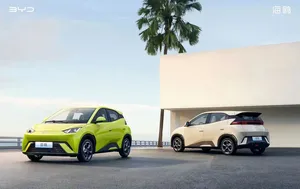
2023 Byd Seagull Ev Car 405km New Energy Vehicle 4 Seats New In Market Byd Seagull Electric Car - Buy Byd Seagull Electric Car E


ChangAn UNI-V Extended-Range Electric Vehicle New Energy Intelligent Luxury Car With High Profile Design Used Car





















Electric vehicles (EVs) are automobiles propelled by one or more electric motors, drawing energy typically from rechargeable batteries. These vehicles are tailored for individuals and businesses seeking eco-friendly alternatives to traditional gasoline-powered cars. Operating on the principle of electric propulsion, EVs convert electrical energy into mechanical energy to propel the vehicle forward.
The allure of electric vehicles stems from their substantial environmental advantages. By eschewing internal combustion engines, EVs emit zero tailpipe emissions, mitigating air pollution and greenhouse gas discharges that exacerbate climate change. This characteristic proves especially advantageous for urban locales grappling with air quality issues and traffic congestion. Furthermore, EVs offer cost-effective operations owing to the generally lower electricity expenses vis-à-vis gasoline, coupled with reduced maintenance costs due to the simplified design of electric drivetrains.
For EV manufacturers and vendors, a deep understanding of the myriad components and technologies comprising these vehicles is imperative for commercial prosperity. Ranging from battery variations to charging infrastructure, each component contributes to the overall functionality and appeal of electric vehicles. Consequently, businesses often invest in EVs to cater to environmentally conscious consumers or fulfill corporate sustainability objectives.
The electric vehicle landscape is diverse, encompassing a spectrum of options from compact cars to heavy-duty trucks, each tailored to specific needs within distinct segments of the transportation market:
Battery Electric Vehicles (BEVs): These are fully electric vehicles powered by rechargeable battery packs for propulsion. BEVs are prevalent in personal transportation and increasingly in commercial settings due to their zero-emission profile.
Plug-in Hybrid Electric Vehicles (PHEVs): PHEVs integrate electric motors with a traditional internal combustion engine. They can be recharged and run on electric power for short distances, switching to the combustion engine for longer trips, offering versatility for drivers requiring extended range.
Hybrid Electric Vehicles (HEVs): HEVs combine an internal combustion engine with an electric propulsion system to enhance fuel efficiency. These vehicles are recognized for their quiet performance and find utility across various vehicle categories including sedans and SUVs.
Fuel Cell Electric Vehicles (FCEVs): FCEVs, albeit less common, employ a hydrogen-powered fuel cell to generate onboard electricity, emitting solely water vapor and warm air. They are predominantly used in sectors prioritizing long range and swift refueling.
Solar-Powered Electric Vehicles: These experimental vehicles harness photovoltaic cells to convert sunlight into electricity, powering an electric motor. Though not mainstream due to limited range, they epitomize an environmentally friendly approach to vehicular power.
When choosing electric vehicles for business applications, several factors warrant consideration to ensure alignment with operational requisites and anticipated benefits. Here's a breakdown of these considerations:
Vehicle Type: The initial step involves determining the most suitable vehicle type—standard, plug-in hybrid, or fully electric—based on typical driving patterns and infrastructure accessibility.
Battery Capacity: For urban-centric businesses with shorter commutes, a PHEV offering a blend of electric and gasoline power may prove most pragmatic. Conversely, companies with predictable daily mileage requirements might find a BEV more suitable.
Charging Options: Assessing the availability of charging stations is crucial when selecting an EV. Some models boast fast-charging capabilities, pivotal for businesses necessitating rapid turnover times.
Tax Incentives: Depending on the region, there exist tax advantages and incentives that can render electric vehicle procurement financially attractive.
Range: Understanding the vehicle's range is essential for logistical planning; it should sufficiently cover planned routes with a margin for unforeseen stops.
Performance Specifications: High-performance models may not be imperative for all business use cases; thus, it's pivotal to align the vehicle's performance attributes with operational demands.
Businesses contemplating EV acquisitions should also evaluate factors such as vehicle features (including cargo capacity and cabin design), maintenance prerequisites, and supplementary functionalities like cruise control options.
Alibaba.com emerges as a global marketplace connecting businesses with an extensive array of electric vehicles tailored to diverse commercial needs. Whether procuring a fleet of urban delivery vans or sourcing high-performance e-bikes for logistics operations, Alibaba.com offers a broad selection from verified suppliers worldwide. The platform's commitment to facilitating international trade renders it an ideal solution for enterprises aiming to expand operations or transition to sustainable transport alternatives.
The assortment on Alibaba.com encompasses vehicles equipped with advanced features such as lithium batteries offering extended ranges and rapid charging capabilities. Additionally, businesses can discover eco-friendly options like e-scooters or electric rickshaws that not only trim operational costs but also contribute to a cleaner environment.
Alibaba.com's Trade Assurance service ensures transaction protection until delivery completion, instilling confidence when procuring electric vehicles from global suppliers. With its user-friendly interface and mobile accessibility, Alibaba.com simplifies supplier communication in local languages and streamlines order management. This holistic approach cements Alibaba.com as an invaluable ally for businesses embracing electric mobility solutions and striving for competitiveness in the market.
The range of an EV varies based on battery capacity, spanning from around 100 miles for compact EVs to over 300 miles for long-range models, influencing usability and consumer appeal.
Charging duration for an EV hinges on battery size and charging station type, ranging from under an hour for rapid charging at designated stations to several hours with a home charger.
Yes, Electric Vehicles can be charged in diverse weather conditions provided charging stations and EVs are adequately insulated and moisture-resistant, which is typically the case.
Electric Vehicles generally incur lower maintenance expenses than traditional cars due to fewer moving parts, regenerative braking, and the absence of oil changes. However, long-term considerations should include battery replacement costs.
Assess daily driving patterns, customer preferences, and specific needs such as cargo capacity or towing capabilities. Different models offer distinct performance, range, and features that should align with business objectives.
Lithium-ion (Li-ion) and lithium-polymer batteries are the most prevalent in Electric Vehicles owing to their high energy density and extended cycle life.
Many Electric Vehicles are designed for home charging using a standard electrical outlet. However, some models may necessitate a home charging station for expedited charging.
Businesses can indeed install charging stations on-site, selecting locations with access to electrical supply meeting the station's power requirements.
Look for charging stations conforming to industry standards, equipped with safety features like overcurrent protection, and offering the appropriate connection type for the EV being charged.
The Electric Vehicle tax credit denotes a federal tax incentive extended to businesses procuring or leasing eligible EVs. The credit amount varies based on battery size and overall efficiency of the vehicle.
Yes, numerous third-party vendors offer Electric Vehicle charging solutions encompassing installation and setup. It is crucial to verify station compatibility with the EV model in use.
Consider expenses like electricity consumption, maintenance for both the Electric Vehicle and charging station, and potential tax credits or incentives, factoring into the overall ownership expenditure.
Electric Vehicles can function in cold weather conditions, albeit with potentially reduced range due to heightened battery usage for cabin heating. Preconditioning the vehicle while plugged in can mitigate this impact.
The longevity of an Electric Vehicle's battery pack hinges on factors such as usage patterns, climatic conditions, and maintenance practices. Typically, a well-maintained battery pack can endure several years before necessitating replacement.
Many Electric Vehicles feature warranties covering the battery pack and electric motor. It is essential to review warranty terms to ensure alignment with the business's requirements.
Regenerative braking enhances an Electric Vehicle's range by recuperating energy typically lost during deceleration or coasting. Moreover, it commonly reduces wear on the braking system, enhancing operational efficiency.